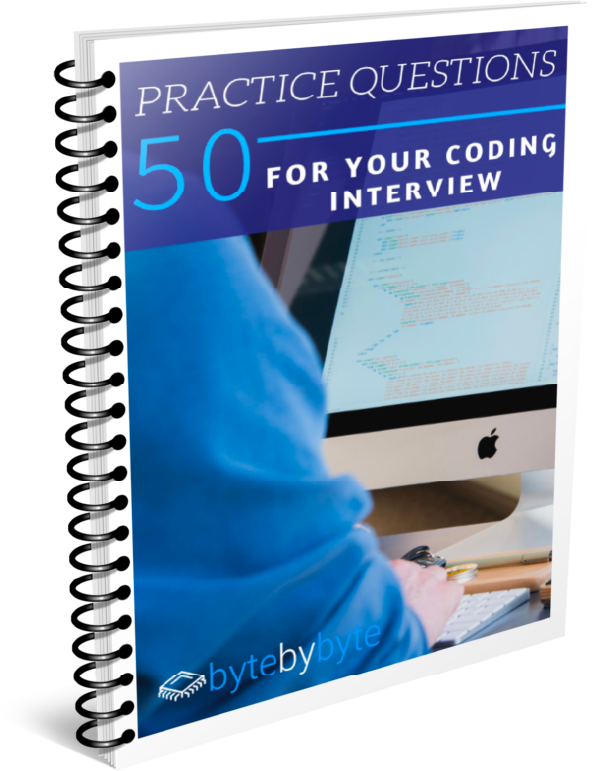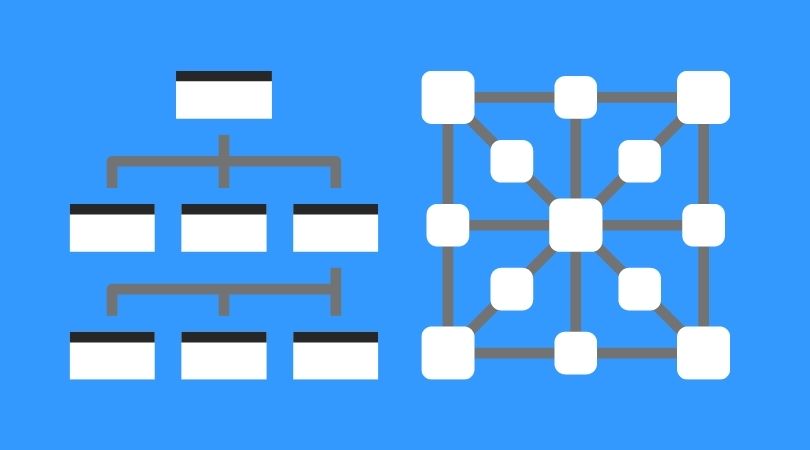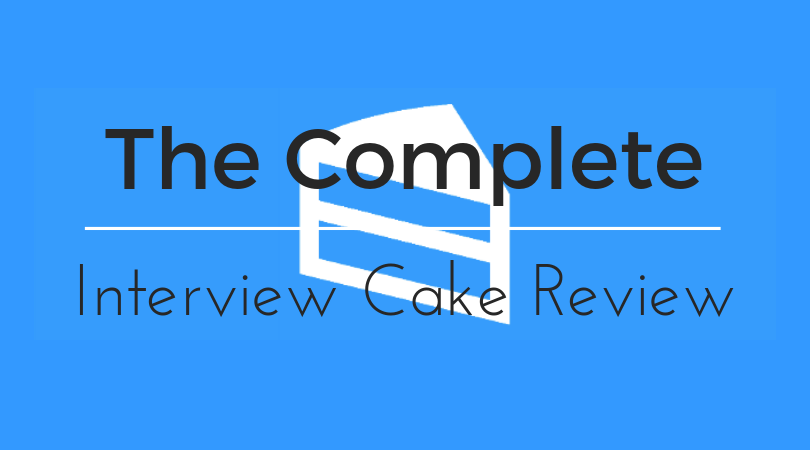
Are you considering buying Interview Cake? Read this first!
In this monster blog post we’re going to do a deep dive into Interview Cake and I’m going to show you the good, the bad, and the ugly.
Ultimately, I’ll help you decide “Is Interview Cake worth it for you?”
Here’s what we’re going to cover:
- Who is Parker Phinney?
- What is Interview Cake?
- How does Interview Cake work?
- How can you get the most out of Interview Cake?
- Is Interview Cake worth it?
This is a pretty long post so feel free to jump around to whatever interests you the most. No hard feelings!
Affiliate Disclaimer: I am an affiliate for Interview Cake, so if you buy through my link I do get a commission at no cost to you.
Who is Parker Phinney?
Back in 2013, Parker Phinney had a life-changing experience.

That was the year that his friend, Alice, who was fresh out of a coding bootcamp, came to Parker for help getting a job.
Alice had been putting in the work and was a badass coder, but she really wanted to take her interviewing to the next level.
“So we got to work running practice problems, drilling her weak points in algorithms and data structures, and focusing on how to arrive at the answers, not just what the answers were.
“She struggled at first, but it took just one weekend to get Alice to a point where she could crush all the interview questions in my arsenal.”
Shortly after working with Parker, Alice landed a job at Facebook!
After the experience of teaching his Alice, Parker started to hone his own skills. He coached students at multiple bootcamps around San Francisco and began to develop methodologies for helping students to “begin breaking down a new problem and keep moving even when you're stuck”.
That was when he realized, like I did early in the history of Byte by Byte, that he truly had a passion for helping students pass their coding interviews.
So he started InterviewCake.
Since 2013, the goal of InterviewCake has been to help as many students as possible pass their coding interviews and get their dream software development jobs.
In that time, they’ve helped thousands of students get jobs at ever major tech company, including Google, Facebook, Apple, Amazon, and pretty much everywhere else you can think of.
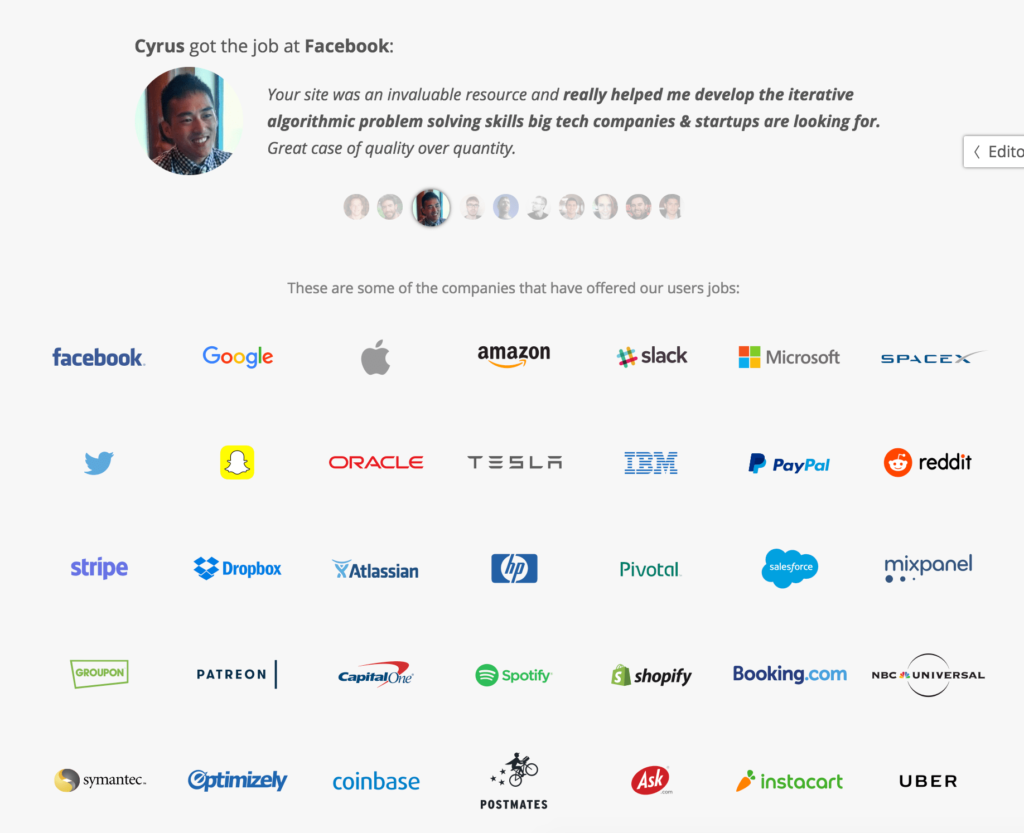
↑ Some of Interview Cake’s success stories ↑
Want to get 50% off your subscription to Interview Cake? Click here.
What is Interview Cake?
At its core, Interview Cake is set of exercises and detailed articles to help make your coding interview a piece of cake.
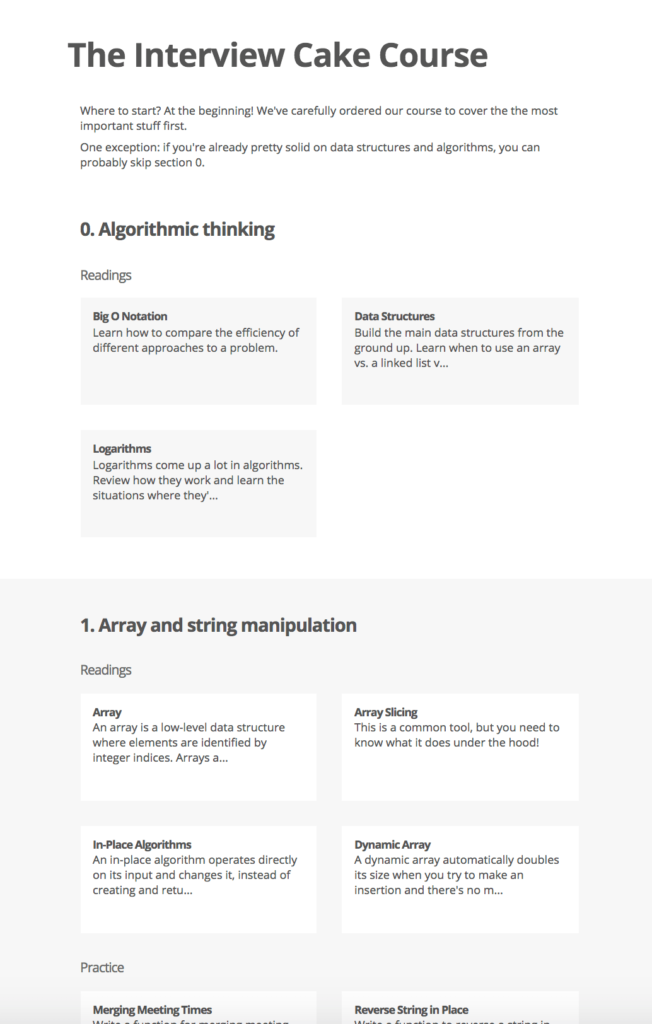
↑ A look at the first few lessons. You can find the whole course Table of Contents here ↑
This is a self-paced course that gives you what you need to work through all the major problem areas that people struggle with in their interviews.
The biggest thing that sets Interview Cake apart (and why I recommend it so often) is that they understand the need to really focus on understanding how to solve the problems rather than just what the solution is.
Each practice problem is broken down into a series of steps:
- Try to solve the problem on your own.
- If you get stuck, each problem has multiple hints to help you. This way you don’t have to just give up and look at the solution.
- Once you think you have the solution, Interview Cake shows you common “gotchas” that people often mess up. This is like having an interviewer in the room with you.
- Finally, when you are confident in your solution, they give you an incredibly detailed breakdown of not only what the solution is, but how to think about the problem so that you know exactly how to solve similar problems in the future.
With Interview Cake, it’s almost like having an interviewer in the room with you.
In addition to the practice problems, Interview Cake also has an extensive archive of articles and interactive lessons that you can work through on each major topic area. Unsure about your core data structures? There’s a post for that. Want to bone up on sorting? Here you go.
One of the main goals of Interview Cake is to become your home base for interview prep, and they are constantly updating and improving the course to become exactly that.
How does Interview Cake work?
Alright in this section, we’re really going to get into the meat of things, so buckle up. There’s a lot here, but I want to make sure that you get a good overview so that you can make an informed decision.
ALSO, if you want to check out anything that I’m showing you, you can try out Interview Cake for free before you sign up.
Interview Cake Overview
When you sign up for Interview Cake, you’ll get taken into the Table of Contents:

Here you can see all of the material that you have available to you and will serve as your home base for the course.
The content here is broken down into 15 sections based roughly around the core topics that you’ll need to know. Each section has articles for you to review the relevant material or if you’re feeling comfortable, you can just jump straight into the practice problems.
Here are two other features that you might find useful:
Everything is multilingual
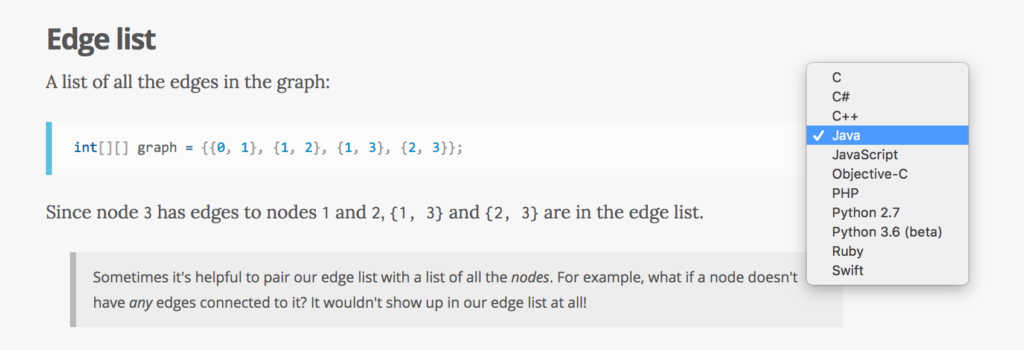
Whether you’re reading an article, doing a practice problem, or looking at the explanations of a specific piece of code, you always have the option of selecting the language that is most useful to you.
A lot of times you’re stuck trying to translate what you’re reading into the language that you actually want to use for your interview, but with Interview Cake it’s all seamless.
“Get the job” guarantee
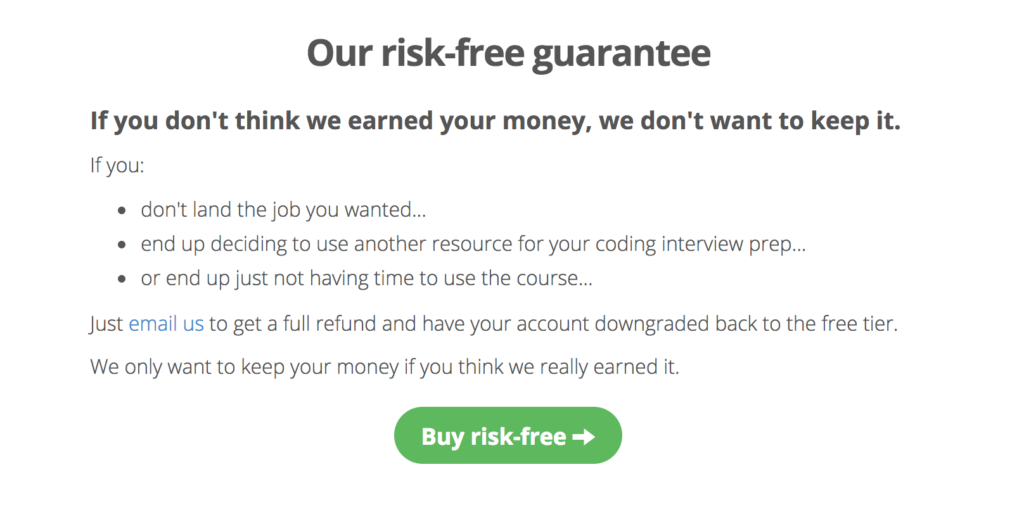
One of the great things about Interview Cake is that you can test it out 100% risk-free.
If you sign up and decide for whatever reason that you wish you hadn’t spent the money, you can always get a refund.
In particular, if you find that you’ve been using Interview Cake and don’t see the results that you wanted, a refund is just an email away.
Practice Problems
As of writing, Interview Cake has more than 50 detailed practice problems for you to study (they’re always adding more). To some people that might sound like a ton and to some that might sound like none at all (it definitely doesn’t compare to ~1000 on Leetcode).
What is great about this relatively reasonable number is that you have a realistic shot of actually going through all of the problems and really learning them.
These problems are carefully curated to cover a lot of the core concepts that you will need to know for your interview and if you learn the strategy behind solving them you will be in good shape.
Interview Cake also helps you work through the problems on your own rather than just giving you the solution. When you’re solving a problem, you have the following options:
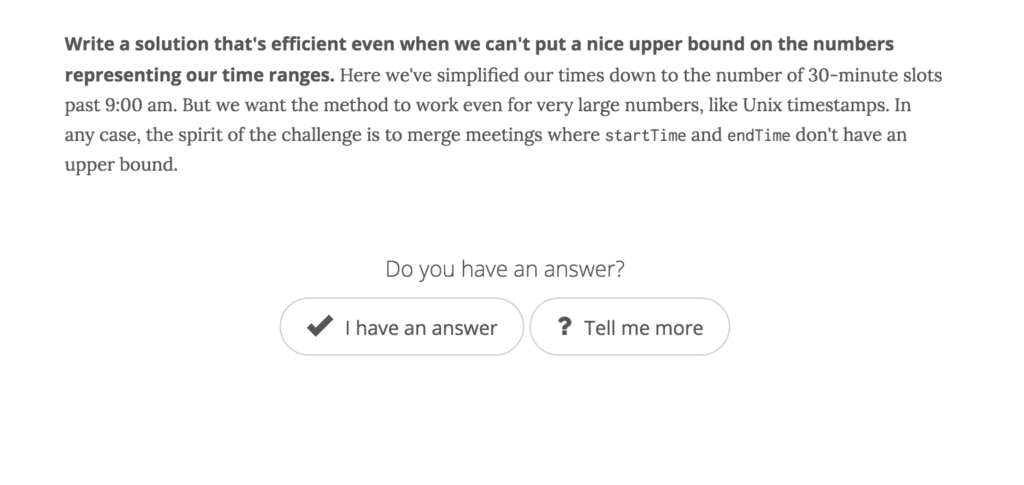
If you select “Tell me more”, you can get a detailed breakdown of the problem. They also only dole it out a few lines at a time so you can keep trying to solve it on your own.
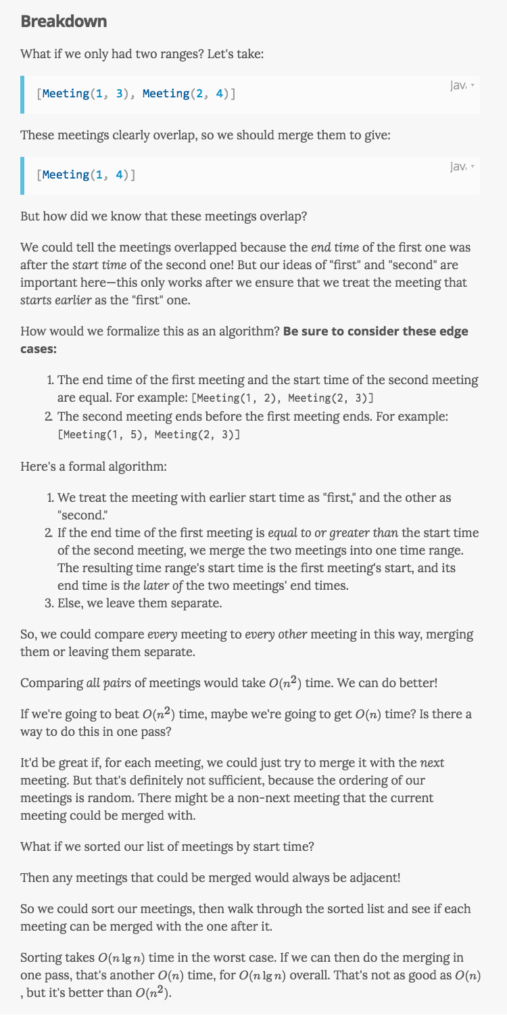
Once you think you have the answer, you’re not quite done, though.
In lots of interviews, we think we have the solution but maybe we missed an edge case or didn’t think of something.
That’s why Interview Cake has a section of “gotchas” that will show if you made any common mistakes:
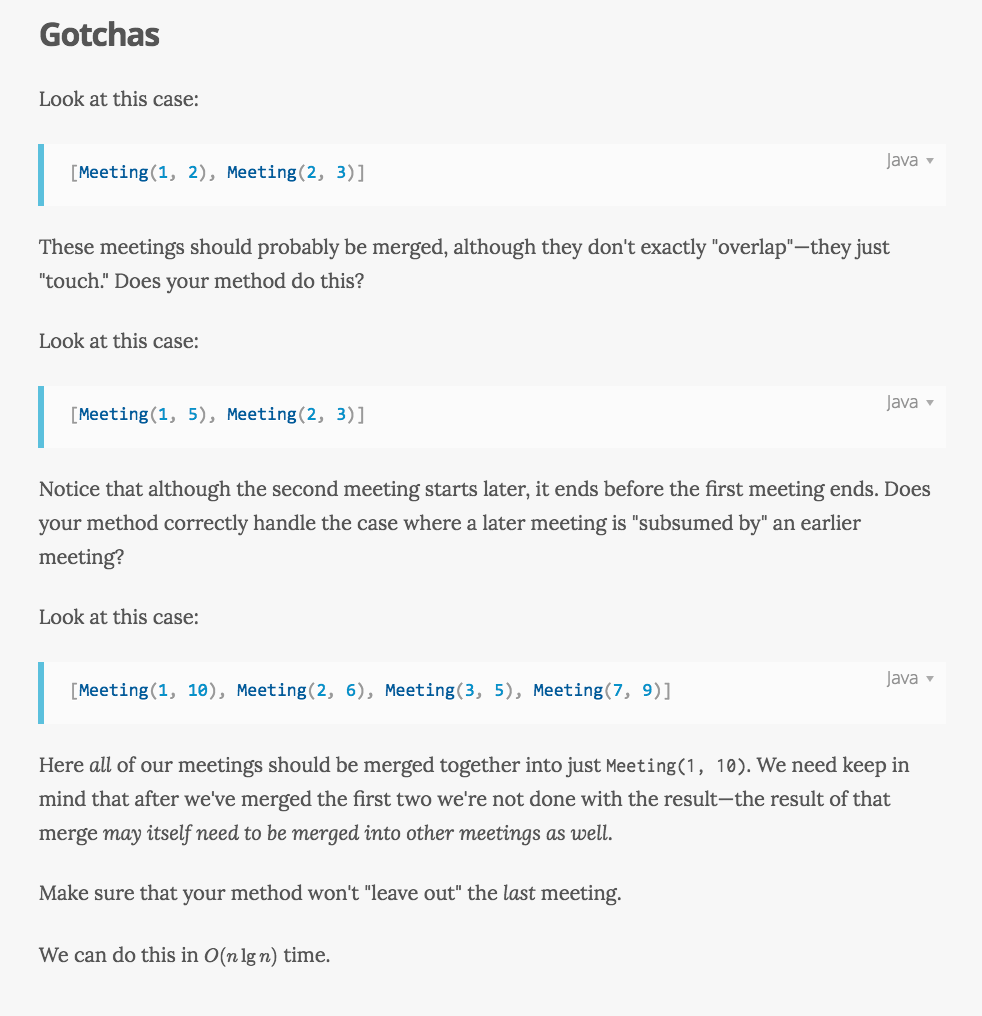
With these “gotchas”, you know if you really understood the problem.
To me, that’s absolutely key. If you’re not actively testing yourself, you’re simply not going to learn as much as you could otherwise.
If you’re wondering what problems you can expect to see in Interview Cake, here is a sampling. You can also find the complete list by going to the Table of Contents:
|
|
|
|
|
|
|
|
|
|
|
|
|
|
|
|
|
|
|
|
|
|
|
|
With this full list of problems, you’ll cover all the major topics that you need to master for your interview.
Code Editor
As we’ve come to expect, and one would hope from any good course like this, Interview Cake does have a built in code editor so that you can test things as you go.
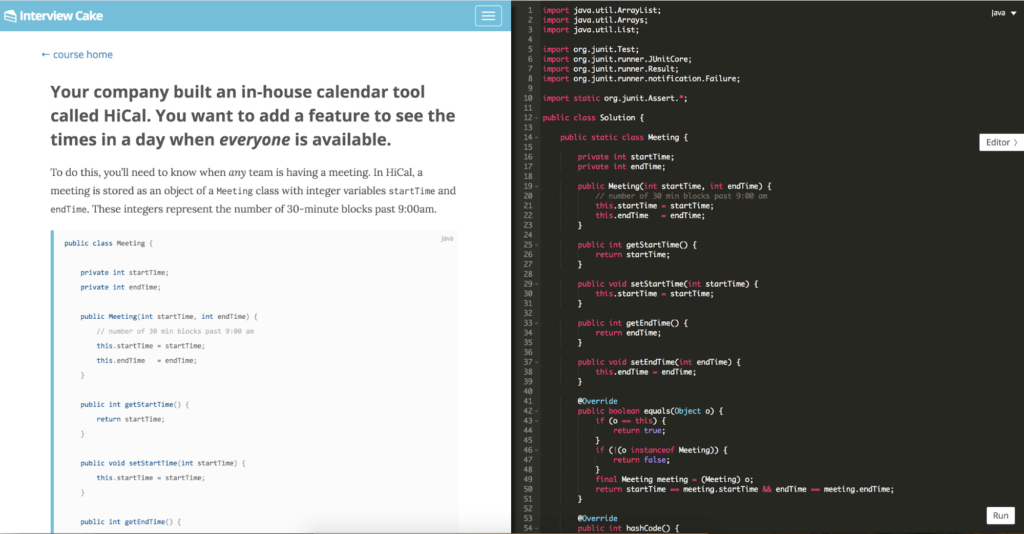
Not too much to describe here. There are plenty of test cases and you can write/run your code in whatever language you like.
Study Topics
All the content on Interview Cake is broken down into 15 sections:
- Algorithmic Thinking
- Array and String Manipulation
- Hashing and Hash Tables
- Greedy Algorithms
- Sorting, Searching, and Logarithms
- Trees and Graphs
- Dynamic Programming and Recursion
- Queues and Stacks
- Linked Lists
- System Design
- General Programming
- Bit Manipulation
- Combinatorics, Probability, and Other Math
- Javascript
- Coding Interview Tips
Each of these is further subdivided into articles on individual topics that you can review in more detail.
Rather than go through each of these in detail, I’m just going to point you to two of my favorite articles so that you can see for yourself. That’s one of the things I love about Interview Cake: A lot of the content is available for free so you can try before you buy.
Data Structures for Coding Interviews
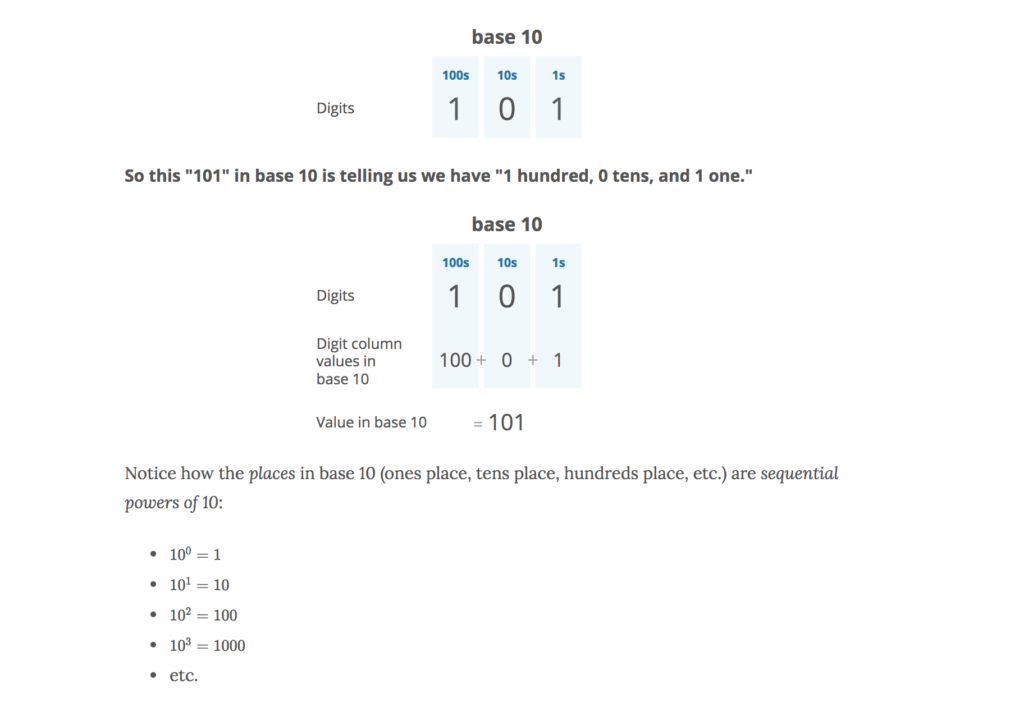
This is one of the most in depth articles that I’ve seen in a long time and it’s definitely worth checking out.
In this article, Parker goes super deep into all of the fundamentals that you need to know, as well as covering many of the common data structures.
As you can see in the image above, one of the things covered in this article is how to think about binary notation. Lots of times we assume that we know things that we’re actually really rusty on. With this post, you can make sure that you actually know what you’re supposed to know.
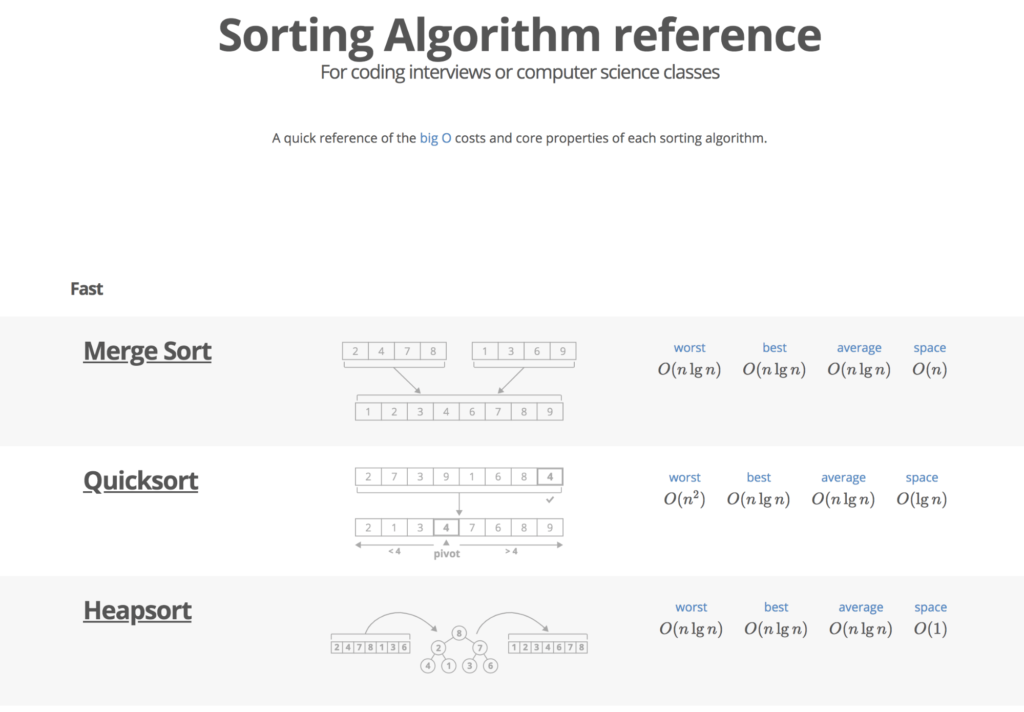
Not only is this page a great overview to begin with, but each sorting algorithm is clickable with detailed explanation.
Parker and the whole team over at Interview Cake have really thought this stuff through so that you can focus your attention on studying and not be searching around just to find a good resource on a topic.
Want to get 50% off your subscription to Interview Cake? Join Now!
How do you use Interview Cake effectively?
Now that you have a decent idea of what Interview Cake actually is and how it works, we’re going to switch gears a little bit.
At the end of the day, Interview Cake is just a resource. Yes a lot of time and energy has gone into making it as effective as possible, but how much you get out of it ultimately comes down to you.
For that reason, I want to highlight a couple incredibly important strategies to keep in mind as you do your interview prep (which are useful whether or not you decide to use Interview Cake).
“The perfect is the enemy of the good”
When we’re studying, one of the things that many of us tend to get stuck on is coming up with the perfect plan. We want to make sure that we’re studying in the most optimal way.
The problem, though, is that that usually prevents us from actually doing the studying that we need to do. We spend all of our time planning and ultimately run out of time to actually study.
Either that or we come up with a plan that is so convoluted that we can’t possibly stick to it.
Imagine spending weeks crafting the perfect plan only to get off track on the first day and have to completely redo it. This is all too common.
As an alternative, I encourage you to focus on making forward progress rather than obsessing over every single detail.
Interview Cake does make it very easy to do this. Since everything is ordered, you can just start at the beginning and walk through everything step by step.
Rather than worrying about every little thing, realize that the order if Interview Cake is already well thought out to provide you with the exact information that you need.
The 80/20 of studying
The 80/20 rule, or Pareto’s Principle, was popularized by Tim Ferriss in The Four Hour Work Week. The basic idea is that 80% of the results that you get will come from 20% of the work.
This is incredibly important to understand when it comes to preparing for interviews. At its core, it means that you should focus on understanding the fundamentals rather than worrying about all sorts of little tricks and unpopular topics.
The key is that you have a limited time to study for your interviews. After all you probably don’t want to spend years studying for a single job. So you need to decide how to prioritize.
To prioritize effectively, you want to focus on the topics that are most likely to occur and cover them at a high level before you go super deep in any one area.
One of the things that I personally love about Interview Cake is that Parker has really focused on giving you the 20% of stuff that you need to know for 80% of the questions that you might be asked.
Rather than having to decipher what exactly you should spend your time on, Interview Cake is laser focused on the most important topics, making it easy for you to handle the most important interview questions.
Active studying
How much do you think that the way that you study affects your memory? What do you think the improvement can be if you improve your study techniques?
10%?
20%?
In fact, that’s exactly what this study found. By using active recall, students were able to go from a 34% recall after 1 week to 85% recall. That’s insane!
And you can use these techniques in your studying too.
The key is to focus on active studying rather than passive studying. These may be terms you’ve heard before, but if not, let’s define them:
- Passive studying: Studying that doesn’t actively engage your brain. This involves things like reading about interview techniques, reading a textbook, watching Youtube videos on effective interviewing, and anything else where you don’t have to actively work.
- Active studying: In this case, you are engaging in the creation process. This could be attempting to solve practice problems, creating a mindmap of important concepts, teaching a friend about a data structure, or anything else that requires you to actively think and recall core ideas.
When you’re studying, you want to focus as much of your time on active studying as possible. Yes it’s a whole heck of a lot more work, but as you can see the results speak for themselves.
If you focus on active study techniques, you can literally cut your total study time in half.
To do this, focus on using recall and recreating what you’re learning.
If you study a new problem, once you think you understand it, close the page and try to code it up yourself without looking at it. If you can do it, great! If not, review a little more and repeat this process. By recalling what you’re learning, you’ll see a huge improvement.
Save 50% on Interview Cake when you sign up today!
Is Interview Cake worth it?
Interview Cake is definitely an investment. Even with our 50% off link, you’re still paying over $100. So the ultimate question we have to answer is, “Is Interview Cake worth the money?”
Now this is going to be different for everyone, so I’ll share what I think, but I’m also going to present the pros and cons so that you can decide for yourself. Sound fair?
The good
There is a lot that I really love about Interview Cake. Here are some of the things:
- Highly curated practice questions
I’ve talked about this before, but one of the biggest problems that I see with students is that they focus on quantity over quality. They would rather grind through 300 Leetcode problems than find the 50 most common interview questions and really focus on those.
At Interview Cake, they have really focused on the most critical questions that you need to know for your interview. This allows you to focus on the 20% of most important stuff, which will ultimately get you the best results most quickly. - Categorization by topic and company
While I don’t think this is super necessary for most people, it is also a super valuable feature when you want it. Looking for Google-specific interview questions? Want to focus on graph problems? Interview Cake categorizes all of their practice problems along several different axes so that you can find exactly what you’re looking for. - Some really deep content
While some of the content on Interview Cake is still a little lacking, there is also some really awesome, deep content on there. These articles on data structures and sorting are great examples of some of the best that Interview Cake has to offer. In addition, they are continually improving the content so I have no doubt that even some of the lacking pieces of content will be improved upon in the near future. - Truly risk-free
Interview Cake has two features that really make it a risk-free purchase. First, you can test-drive a lot of the content without having to pay. If you’re not sure whether Interview Cake is right for you, you get free access to the Table of Contents, many of the articles, and even 3 practice problems of your choice without having to pay a cent.
Second, they have one of the best guarantees I’ve seen. Parker guarantees that if for whatever reason you’re unsatisfied, even if that’s just because you didn’t pass your interview, there is a 100% refund. That way you literally only pay if Interview Cake works for you and you get a job.
The bad
While there’s a lot to love about Interview Cake, there are also some definite areas that could use improvement. Here are my main criticisms:
- No video content
Unlike my prefered teaching method, Interview Cake is completely text-based. I don’t think this is a huge issue because they have done a really solid job of creating high-quality text-based content. However if you learn better through videos or if you want to see how to solve these questions in real time, there isn’t really an option available to you here. - Lack of defined study path
Interview Cake provides a solid set of resources for you to prepare with, but like Cracking the Coding Interview and many other resources, there isn’t a clearly defined study path, since it’s organized by topic and not by how you should study. Yes there is an order, so you can easily just follow through the content in the order that it’s presented, but it would be nice to have a clearer roadmap of how to most effectively tackle the material. No great mechanism for getting help
If you are going through Interview Cake materials and find yourself needing help, the only real option that you have is to email Parker directly. Since he’s a pretty busy guy, there’s only so much help you’re actually going to be able to get from him. Therefore if you’re the kind of person who likes to ask a lot of questions, this may not be the right fit.
Update: Interview Cake now has a Slack group that you can find here.- 3 weeks or 1 year subscription
I’m not personally a huge fan of the membership plan that Interview Cake offers. For all of our courses, we like to offer lifetime access, but Interview Cake membership options are only a 3 week or a 1 year subscription that you have to renew if you’d like to continue using. The advantage of this is that it lowers the price, but the disadvantage of course is that you don’t have lifetime access.
The verdict
Ultimately, Interview Cake is great for someone who is looking for a concise set of materials to really help you focus on the most important topics for you to prepare for your interview. It does a great job of filtering out the fluff and giving you just the most important topics to focus on.
Because of this, it’s a great resource if you have interviews coming up relatively soon and want a solid resource to review with. Interview Cake is also great if you really do want to focus on quality over quantity in your studying.
If that describes you and you can afford the price tag, it’s well worth it.
However if you’re someone who craves structure or is still early in your coding career, this course may not be the right fit. In cases like that, I would highly recommend checking out a Coursera course such as this one from Princeton. It will give you a lot of structure and help you improve your coding skills.

